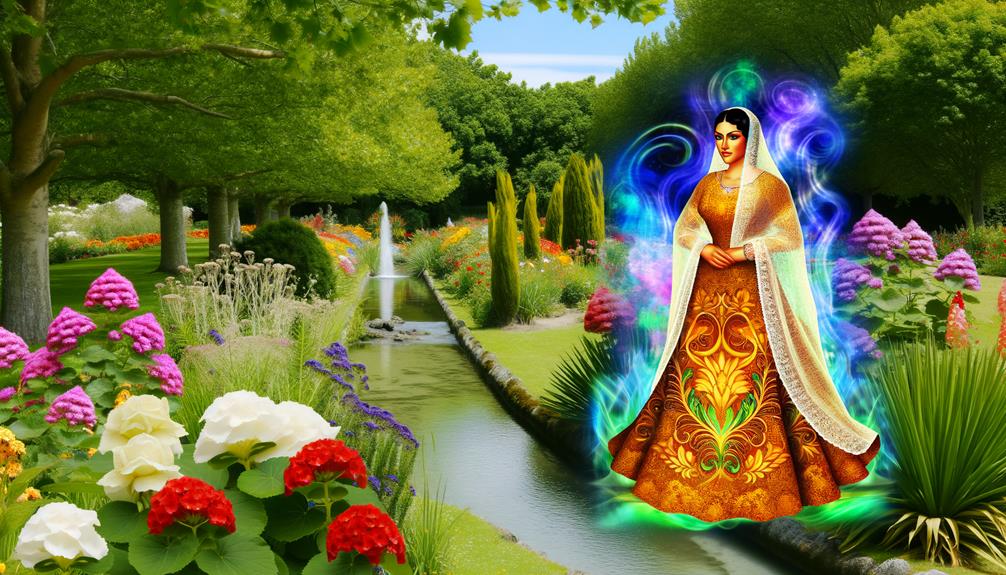English Name for Female With Meaning
Choosing an English name for a female encompasses rich historical, cultural, and linguistic significance. Classic names like Elizabeth ('God is my oath') and Mary ('beloved') evoke timeless values.
Modern favorites such as Harper ('harp player') and Avery ('ruler of the elves') reflect contemporary trends. Nature-inspired names like Willow stand for resilience, while names from literature such as Emma signify intelligence.
Royal names like Victoria imply strength and longevity, and virtue names like Faith and Grace echo moral excellence. Names such as these are more than labels; they weave a tapestry of cultural and historical narratives, enriching a person's identity.
Continue exploring to uncover the diverse meanings behind these names.

Key Takeaways
- Elizabeth: Means 'God is my oath,' signifying steadfastness and devotion.
- Harper: Means 'harp player,' blending traditional roots with a modern twist.
- Aurora: Evokes the natural light display of the Aurora Borealis.
- Emma: Derived from 'ermen,' meaning whole or universal.
- Seraphina: Means fiery, ardent, and angelic.
Classic Names
In the world of English nomenclature, classic names for females such as Elizabeth, Catherine, and Mary have endured through centuries, embodying a sense of timeless elegance and cultural heritage.
Elizabeth, rooted in Hebrew, signifies 'God is my oath,' reflecting steadfastness and devotion.
Catherine, derived from Greek, means 'pure,' symbolizing innocence and virtue.
Mary, of Hebrew origin, translates to 'beloved' or 'wished-for child,' resonating with deep emotional and spiritual significance.
These names have transcended generations, embedded in history, literature, and royalty, thereby maintaining their revered status.
Their phonetic simplicity and profound meanings contribute to their perennial appeal, serving as a linguistic attestation to the enduring legacy of classical English nomenclature.
Modern Favorites
While classic names continue to hold a cherished place in English nomenclature, contemporary trends have brought forth a new wave of modern favorites that reflect current cultural influences and societal values.
Names such as Harper, meaning “harp player,” and Avery, derived from an Old English surname meaning “ruler of the elves,” have surged in popularity. These names often embody a blend of traditional roots with a modern twist, appealing to parents seeking uniqueness and relevance.
Additionally, the rise of gender-neutral names like Quinn, which means “chief,” signifies a societal shift towards inclusivity and flexibility in gender identity. This modern naming trend illustrates a dynamic interplay between historical significance and evolving cultural mores.
Nature-Inspired Names
Frequently, nature-inspired names draw upon the beauty and majesty of the natural world, offering parents a meaningful way to imbue their child's identity with a sense of connection to the environment. These names often evoke imagery that is both serene and powerful, reflecting diverse aspects of the earth's rich tapestry. From flora to fauna, elements to landscapes, nature-inspired names carry a timeless appeal.
Willow: Symbolizing flexibility and resilience, often associated with the graceful willow tree.
Aurora: Evoking the breathtaking natural light display of the Aurora Borealis.
Luna: Inspired by the moon, representing calm, mystery, and femininity.
Ivy: Denoting fidelity and eternal life, linked to the climbing plant.
Sierra: Reflecting the grandeur of mountain ranges and rugged terrains.
These names provide a profound connection to nature's essence.
Literary Names
Drawing inspiration from the timeless world of literature, literary names for females often carry with them a rich legacy of cultural significance and narrative depth. Names such as 'Emma,' derived from Jane Austen's beloved heroine in 'Emma,' evoke themes of intelligence and independence.
'Juliet,' from Shakespeare's 'Romeo and Juliet,' symbolizes romantic passion and youthful innocence. Charlotte, inspired by the author Charlotte Brontë, suggests creativity and resilience.
Literary names not only reflect the qualities of iconic characters but also serve as a bridge between contemporary identity and historical narrative. Each name, steeped in the rich tapestry of storytelling, offers a unique connection to the virtues and vices portrayed in classical literature, thereby imbuing modern identity with timeless values.
Royal Names
Royal names for females often convey an aura of elegance, authority, and historical prestige, reflecting centuries of monarchical heritage and cultural significance. These names are imbued with a sense of grandeur and sophistication, often deriving from notable queens, princesses, and empresses who have left an indelible mark on history. They bring with them a wealth of cultural resonance and gravitas, making them timeless choices.
- Elizabeth: A name linked to powerful queens, symbolizing resilience and grace.
- Victoria: Embodying the strength and longevity of Queen Victoria's reign.
- Catherine: Reflects the intelligence and political acumen of Catherine the Great.
- Diana: Evokes the philanthropic spirit and beloved status of Princess Diana.
- Alexandra: Echoes the elegance and dignity of various European royals.
These names are more than mere labels; they are legacies.
Virtue Names
Virtue names for females, characterized by their embodiment of moral qualities and desirable traits, have historically served as a means to inspire and reflect societal values through nomenclature.
Names such as Faith, Hope, Charity, and Grace are classic examples, each encapsulating a distinct virtue esteemed by various cultures and religious traditions. These names offer more than aesthetic appeal; they provide linguistic continuity to ethical ideals and cultural narratives.
The Puritans, in particular, popularized virtue names during the 17th century, viewing them as a manifestation of personal and communal piety. Today, virtue names continue to resonate, offering parents a way to imbue their child's identity with aspirational values that transcend temporal trends, fostering a timeless connection to moral excellence.
Mythological Names
Mythological names for females often draw upon the rich tapestry of legendary goddesses and heroines, whose narratives have shaped cultural identities across eras.
Names such as Athena and Freya invoke the power and wisdom of ancient deities, while appellations like Guinevere and Morgana reflect the allure and complexity of mythical characters.
Additionally, names inspired by magical creatures and spirits, such as Nymph and Sylph, offer a unique blend of ethereal charm and enchanting mystique.
Legendary Goddesses and Heroines
Delving into the rich tapestry of global mythology, one encounters a pantheon of legendary goddesses and heroines whose names carry profound cultural and historical significance. These names resonate with timeless elegance and power, evoking the stories and virtues these figures embody.
- Athena: The Greek goddess of wisdom and warfare, symbolizing strategic prowess and intellect.
- Freya: A Norse deity associated with love, beauty, and fertility, embodying enchanting allure.
- Artemis: Known as the Greek goddess of the hunt, representing independence and fierce protection.
- Isis: Revered in Egyptian mythology as the goddess of magic and motherhood, illustrating nurturing strength.
- Brigid: A prominent figure in Celtic lore, associated with healing, poetry, and craftsmanship, signifying creativity and resilience.
These names continue to inspire and captivate, reflecting the enduring legacy of mythological heritage.
Magical Creatures and Spirits
In the world of mythological lore, magical creatures and spirits offer a fascinating glimpse into the diverse and imaginative ways cultures around the world have personified the unknown and the supernatural. Names derived from these beings often carry rich connotations and mystical charm.
For example, the name 'Selkie,' rooted in Scottish folklore, refers to seal-women who transform into humans. Similarly, 'Nymph,' from Greek mythology, evokes the ethereal spirits of nature. 'Fae,' an English derivative of fairy lore, conveys enchantment and otherworldliness.
These names not only resonate with cultural heritage but also imbue a sense of wonder and intrigue, making them compelling choices for those seeking names with profound mythological significance.
Popular Names
An in-depth analysis of popular names for females reveals a fascinating interplay of cultural heritage, linguistic trends, and societal influences. These names often carry meanings that reflect virtues, beauty, and historical significance. When examining the origins of these names, it is interesting to consider how they have evolved over time and been adopted by different cultures. For example, the name “Sophia” has Greek origins and means wisdom, while “Emma” has Germanic roots and means whole or universal. Additionally, the question “what does maiden name mean” often arises, highlighting the significance of a woman’s original surname before marriage. These names serve as a reflection of the values and beliefs of their respective societies, making them a rich and meaningful aspect of cultural identity.
The popularity of a name can be a mirror to the prevailing cultural zeitgeist, as well as a nod to timeless classics.
- Emma: Derived from the Germanic word 'ermen,' meaning whole or universal.
- Olivia: Rooted in the Latin 'oliva,' symbolizing peace and fertility.
- Sophia: From the Greek word 'sophos,' translating to wisdom.
- Ava: Of uncertain origin, possibly meaning life or bird.
- Isabella: A variant of Elizabeth, meaning pledged to God.
These names exemplify the intricate blend of etymology and cultural resonance.
Unique Choices
Exploring the domain of unique choices in female English names reveals a treasure trove of rare gem names, each exuding elegance and rarity.
These names not only stand out due to their uncommon nature but also carry distinctive meanings that add depth and significance.
Rare Gem Names
Delving into the world of rare gem names reveals a treasure trove of unique and culturally rich options for female names. These names are not only distinctive but also carry historical and symbolic significance, making them ideal for parents seeking a name with depth and beauty.
- Beryl: Originating from the Greek 'beryllos', it symbolizes light and clarity.
- Peridot: Known as the 'Evening Emerald,' signifies strength and protection.
- Garnet: Derived from the Latin 'granatum', this name suggests energy and passion.
- Jacinth: An ancient name, symbolizing healing and wisdom.
- Tourmaline: A name that embodies diversity and creativity, reflecting the gem's variety of colors.
These rare gem names offer a blend of elegance, history, and meaning.
Elegant and Uncommon
In the quest for names that exude elegance and remain uncommon, one uncovers a selection of choices that are not only distinct but also resonate with cultural depth and linguistic sophistication. These names reflect a blend of historical richness and contemporary appeal, making them ideal for those seeking uniqueness.
| Name | Origin | Meaning |
|---|---|---|
| Seraphina | Hebrew | Fiery, ardent |
| Elowen | Cornish | Elm tree |
| Isolde | Welsh | Ice ruler, battle |
Each of these names offers a narrative steeped in tradition while presenting an aura of refined distinction. Their phonetic elegance and storied backgrounds provide a nuanced selection for parents aiming to bestow a name that stands out with grace and significance.
Distinctive Meanings Explained
Building upon the foundation of elegance and rarity, the distinctive meanings behind these unique names further enhance their allure and cultural resonance. Each name carries a rich tapestry of linguistic heritage and cultural significance, offering a window into diverse traditions and histories.
Here are a few names with their distinctive meanings:
- Elysia: Deriving from the Elysian Fields in Greek mythology, it symbolizes bliss and paradise.
- Seraphina: Rooted in Hebrew, this name signifies fiery and angelic, tying to the seraphim angels.
- Callista: Of Greek origin, meaning 'most beautiful', it reflects timeless beauty.
- Imogen: A Shakespearean invention, embodying innocence and purity.
- Elowen: Cornish for 'elm tree', representing strength and resilience.
These names exemplify how etymology and cultural backgrounds enrich their intrinsic value.
Conclusion
In the intricate tapestry of English female names, each thread weaves a story rich with history, culture, and meaning. From the timeless elegance of classic names to the fresh allure of modern favorites, the verdant imagery of nature-inspired names to the regal splendor of royal names, each category offers a unique glimpse into societal values and aspirations.
This linguistic mosaic not only provides identity but also reflects the evolving cultural ethos, capturing the essence of human experience and expression.






